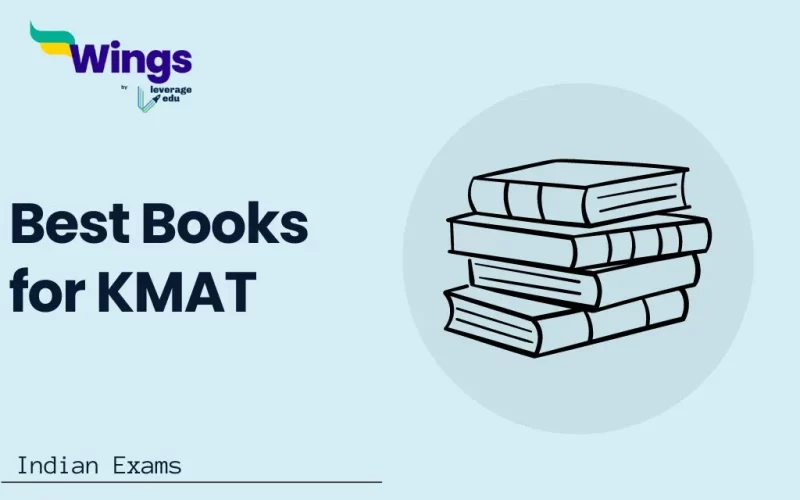KMAT Books: The Karnataka Management Aptitude Test, commonly known as the KMAT exam, is an exam conducted by the Karnataka Post Graduate Private Colleges Association (KPPGCA) once a year. The exam is conducted to select eligible and qualified candidates for admission to various MBA programmes into more than 169 AICTE-approved university-affiliated top business schools in the state of Karnataka.
KMAT is expected to be held in more than 10 cities all over the country and candidates from all over are eligible to apply. Interested candidates can continue reading the blog article below to learn more about the best books for reference for the KMAT Exam 2024.
| Particulars | Details |
| Name of the Exam | Karnataka Management Aptitude Test (KMAT) |
| Examination Conducting Body | Karnataka Post Graduate Private Colleges Association (KPPGCA) |
| Level of Exam | National-level entrance exam |
| Mode of Application | Online |
| Duration of the Examination | 120 minutes (2 hours) |
| Type of Question | Multiple choice questions (MCQs) |
| Total Number of Questions | 120 |
| Language of the Examination | English |
| Official Website | www.kmatindia.com |
Table of Contents
Best Books for KMAT Exam 2024
Candidates who wish to ace the KMAT exam with flying colours should ensure that they have the best resources and study material available to them. Here are some of our recommended books for each section of the exam as per the subjects:
Quantitative Ability
The finest books for the KMAT question paper’s Quantitative Ability part may be found below. Number systems, graphs, arithmetic equations, ratios and proportions, and other subjects are covered.
| Book | Author |
| Quantitative Aptitude for All Competitive Examinations | Abhijit Guha |
| Pearson Guide to Quantitative Aptitude and Data Interpretation for CAT | Nishit Sinha |
| How to Prepare for Quantitative Aptitude for CAT | Arun Sharma |
Mathematical Skills
This section is also known as quantitative ability. This section of the entrance exam will test the understanding of quantitative reasoning and analytical skills along with the numerical skills of the appearing candidates. The examinee must be well aware of arithmetical operations including algebra, geometry, trigonometry and other sections of mathematics.
| Books | Authors/Publishers |
| The Pearson Guide to Quantitative Aptitude and Data Interpretation | Nishit Sinha |
| Quantitative Aptitude for Competitive Examinations | Abhijit Guha |
| Arihant Fast Track Objective Arithmetic | Rajesh Verma |
| Objective Arithmetic: Numerical Ability Tests for Competitive Examinations | R. S. Aggarwal |
Language Comprehension
Language comprehension is also commonly known as verbal ability and reading comprehension. The English comprehension section of the entrance examination tests the candidates on the basics of general English and comprehension skills like grammar, vocabulary, synonyms, antonyms, etc.
| Books | Authors/Publishers |
| Word Power Made Easy | Norman Lewis |
| The Pearson Guide to Verbal Ability and Logical Reasoning | Nishit K. Sinha |
| Verbal Ability and Reading Comprehension | Gautam Puri |
| Arihant Verbal Reasoning | Indu Sijwali and B. S. Sijwali |
Logical Reasoning
This section is also known as logical and abstract reasoning and it tests the examinee’s ability to understand and reason concepts quickly and accurately. This section usually consists of questions in sets and individual ones as well based on verbal reasoning, analogy, etc.
| Books | Authors/Publishers |
| S. Chand A Modern Approach to Verbal and Non-Verbal Reasoning | R. S. Aggarwal |
| Arihant Verbal Reasoning | Indu Sijwali and B. S. Sijwali |
| A Modern Approach to Logical Reasoning | R. S. Aggarwal |
| Logical Reasoning and Data Interpretation for CAT | Nishit K. Sinha |
| Shortcuts in Reasoning (Verbal, Non-Verbal, Analytical & Critical) for Competitive Exams | Disha Experts |
Also Read: Must-Read MBA Books for Professionals
KMAT Exam Preparation Tips
A few preparation tips are also mentioned below for interested candidates.
- Develop a habit of revising everything you have prepared for the examination.
- Create a study plan for efficient exam preparation.
- Use active learning techniques such as note-making, summarising, re-reading etc.
- You can also practise past exams and make yourself familiar with the exam pattern.
- The most important part of exam preparation is to manage your time accordingly.
- Make time for exercising and taking breaks during your preparation to improve your productivity levels.
Also Read: KMAT Kerala Merit List 2024: Link to View and Download
FAQs
The Karnataka Private Post Graduate Colleges Association (KPPGCA) administers the Karnataka Management Aptitude Test (KMAT) as a prerequisite for admission to the MBA, PGDM, and MCA programs offered by a number of Karnataka colleges and universities. It started back in 2003.
The question paper is divided into three sections- language comprehension, mathematical skills and basic aptitude.
Combining the three sections of the examination, there will be a total of 120 questions and each section will consist of 40 questions in the KMAT examination.
Every year thousands of candidates appear for the KMAT exam to get admitted to AICTE-approved universities for MBA programmes. To help students prepare well for the entrance exam, we have provided a list of some of the best books in this blog to help them study accordingly and ace the exam with a strategic approach. We hope candidates find it helpful and help them prepare for the exam.
This was all about the “KMAT Books.” For more such informative blogs, check out our Management Exams Section, or you can learn more about us by visiting our Indian exams page.
 One app for all your study abroad needs
One app for all your study abroad needs













